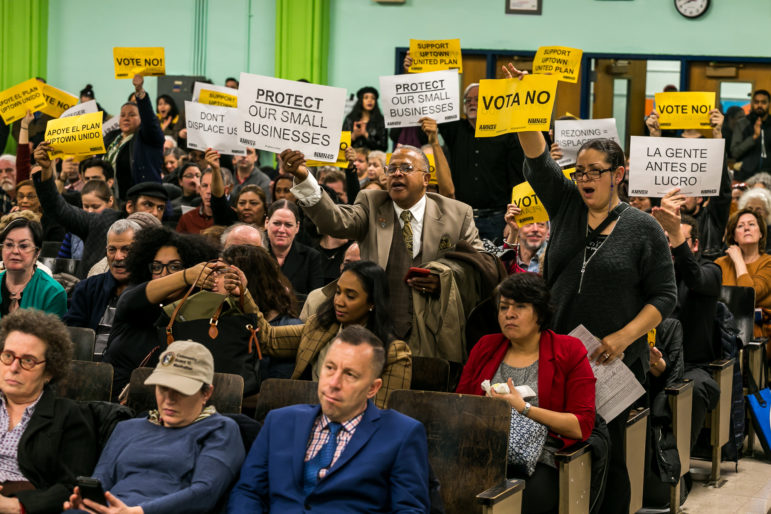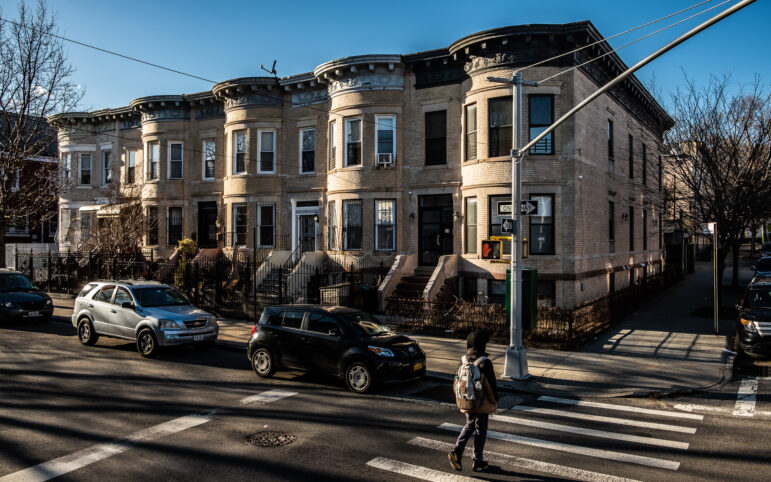
Photo by: Marc Fader
Sara Monestime (in red) of 201 Spencer Street and Kwana Lamar-Reinoso of 195 Spencer Street in Brooklyn discuss the problems with their buildings, as two-year-old Madelyn Monestime looks on.
Sara Monestime has learned more about real estate, politics and New York City’s byzantine housing code than she ever bargained for. Sitting recently in the kitchen of her Brooklyn condo as her two-year-old daughter napped, she talked in the jargon of “zoning lot mergers” and “variances” and mentioned obscure bureaucrats she knows by first name. Monestime has made the country’s most complicated development code “her life,” as one friend put it. Knowing the nomenclature and the players hasn’t rescued her, though, from a legal limbo and potential financial ruin.
“When you deal with these city agencies, I’m learning, logic goes out the friggin’ window,” Monestime said. “They make the rules. They make no sense to anybody else and they can change the rules when they want.”
Monestime’s was one of 72 families, most of them first-time home buyers, who in 2004 bought into the Spencer Street condominiums in Bedford-Stuyvesant only to find a year later that their investments were worthless because the developer, Mendel Brach, failed to comply with zoning rules when he constructed four nine-story buildings in a neighborhood typically capped at five stories.
When Brach submitted the plan for the four Spencer Street buildings to the Department of Buildings (DOB) in 2002, he said that the apartments would be reserved for faculty members of the Beth Chana School for Girls, a yeshiva based in Williamsburg. Under the zoning code’s community facilities exemption, this allowed him to give each structure an extra four stories.
But a year later he submitted a plan to the state attorney general’s office, then run by Eliot Spitzer, to sell the units on the open market, and made no mention of faculty housing. He claimed instead that he would overcome the height restriction through a “zoning lot development agreement,” a technical process whereby a building can rise higher than normal if an adjacent property remains low-rise.
Brach never went through with that zoning lot development agreement. Because the buildings were rife with defects and building code violations, in 2005 the city revoked each building’s temporary certificate of occupancy–the document that entitles owners to legally occupy, refinance or sell their property.
Had the DOB caught these problems before Monestime closed on the property, the sale never would have gone through. But during the time between the building’s construction and the decision to revoke its certificate of occupancy, city inspectors approved a temporary certificate of occupancy three times, just long enough for the sales to be completed and the residents to move in. Those building inspectors apparently did not realize the apartments were not going to faculty members, even though an anonymous complaint was filed with the DOB two months before Monestime closed her purchase, warning that the buildings “were filed as faculty residences but are being sold as apartments.”
Whatever the reason for the inspectors’ lapses, events left buyers like Monestine owning properties that have no legal right to exist. With no certificate of occupancy, the residents have been forced to keep up on mortgage payments on properties they cannot legally sell or refinance. They worry that their money is going into a black hole.
After years of false starts in negotiation with Brach, Andrew Cuomo’s office sued the developer in September 2009, alleging six counts of fraud. Brach settled the suit by consenting to a judgment of $10.9 million to be awarded to the Spencer Street residents. He also agreed not to sell condos for five years. The agreement did not require him to admit fault.
But so far the residents, who paid between $280,000 and $445,000 for their condos, have received little money and are struggling to come up with the millions of dollars needed for building repairs to make their homes conform to DOB regulations. Nor has Brach transferred the air rights from the adjacent lot to bring the building’s height into compliance with the zoning law. (Brach has said that the zoning lot development agreement never came to fruition because the original owner of the lots reneged on a business deal that delayed the transfer of air rights, a dispute that was settled in a rabbinical court ruling that is not publicly available, according to people with knowledge of the case.)
Brach has claimed that he never intended to pull a bait-and-switch with the faculty housing, but rather that after the Department of City Planning had articulated its view that the community facilities clause could no longer be interpreted to include faculty housing, he decided to go with plan B, using the zoning lot development agreement to sell the condos to Monestime and the other middle-class home buyers.
Residents find this hard to believe, given the convenient timing and the fact that the architect of Spencer Street, Henry Radusky of Brooklyn-based Bricolage Architecture & Designs, had gained a reputation for exploiting the faculty housing exemption. In its complaint against Brach, the attorney general alleged that Brach’s failure to reveal the faculty housing exemption along with leaving the building with defects and never securing a permanent certificate of occupancy, amounted to fraud.
From the late 1980s, through the Giuliani administration and into Mayor Bloomberg’s first term, the loophole for “community facilities” was liberally interpreted to mean that with the imprimatur of a school or university, a building could violate local height restrictions—as determined by a complex formula called “floor area ratio”—if its builder claimed that it was intended to house teachers. For many years, a soft real estate market in neighborhoods like Bed-Stuy and Williamsburg limited the loophole’s impact. But when the market heated up, developers began to exploit it more aggressively.
Just a month after Monestime closed on her condo in 2004, the City Council approved a revision to the zoning rules that excluded faculty housing exemptions after a recommendation by the Department of City Planning,
Through the years, Spencer Street residents have been flabbergasted by the city and state’s inability to persuade Brach to make amends, and by the fact that he has never faced criminal prosecution. They all suspect that Brach has political connections.
“I don’t have proof that somebody helped him, but I can’t figure out why he hasn’t been brought to justice,” says Lisa Johnson, who lives at Spencer Street with her husband and seven-year-old son.
Allies of Spencer Street are sympathetic to their frustrations after so many years of bureaucratic dithering. Brach’s “ability to engage in fraud without consequence over numerous years does raise suspicions that someone in power may be trying to protect him,” says Assembly Member Hakeem Jeffries. Yet he added that the situation was probably “better explained by the overly friendly attitude that the Bloomberg administration has had toward development in the last decade.” From 2000 through 2008, Brach contributed $26,400 to city and state politicians. Adam Leitman Bailey, Spencer Street’s lawyer, blames the debacle not on political connections but on loose regulation. “The system allows you to get away with a lot,” he says.
While the Spencer Street owners’ beef is with Brach, the residents themselves are the sort of newcomers associated during the real estate boom with gentrification in once-marginal neighborhoods around the city. From 2000 through 2008, the city added 170,000 new living units, according to the Furman Center for Real Estate and Urban Policy, many of them in “areas of the city that hadn’t seen large-scale building for some time.”
Ironically, it is the Bloomberg administration’s professed opposition to illegal development that is now indirectly thwarting the efforts of Spencer Street residents to escape their legal limbo.
The city could provide a special variance or rezoning to bring the buildings into compliance with zoning regulations, which would allow a certificate of occupancy to be issued. But the city is reluctant to do that because it would send the wrong message to developers about the consequences of flouting city law.
Daniel Weintraub, a Spencer Street resident, says the city is applying the law selectively. “The bottom line is the rules are there to be bent, it’s just only the developers can bend them apparently,” he says.
Instead, the city has encouraged the residents to again negotiate with Brach to have him transfer the air rights from adjacent properties, a move that would bring the condos into compliance. Most recently, Brach has offered to fix the building’s violations himself and effectuate the zoning lot merger—if the residents waive the $10.9 million judgment that also prohibits him from doing business in real estate. The next meeting between Brach and Spencer Street is scheduled for this week.
So far, most of the money that the residents have received has been in the form of garnished wages from Brach’s job at a Brooklyn Bakery, which amounts to just $280, or $3.88 per unit, a month. Bailey, Spencer Street’s lawyer, says that Brach may be trying to hide assets. As late as 2006, Brach had an “approximate net worth of $44 million…. almost all of it in real estate investments,” Bailey wrote in an email.
Brach declined to be interviewed, but in a statement sent through his lawyer, he said: “I have worked with the New York Attorney General and the Spencer St. Condominiums for several years and have spent more than $1 million to help investigate and repair conditions in the buildings. In the Fall, I consented to judgments in favor of the Attorney General and the condominiums. Unfortunately, like others in this last recession, I have had to give up my assets to various lenders and mortgagees for no consideration. Therefore, although others might believe otherwise, I do not have the means to restore these buildings on my own. Nevertheless, I will continue to do all in my power to help bring the buldings up to the highest standards possible.”
Monestime is unsure how to proceed. On one hand, she wants the bureaucratic and financial nightmare to end. On the other is her desire for Brach to be held accountable. “We’re going to drop a $10 million judgment for air rights that should have been ours from the beginning?” she says. “It’s just so twisted.”








